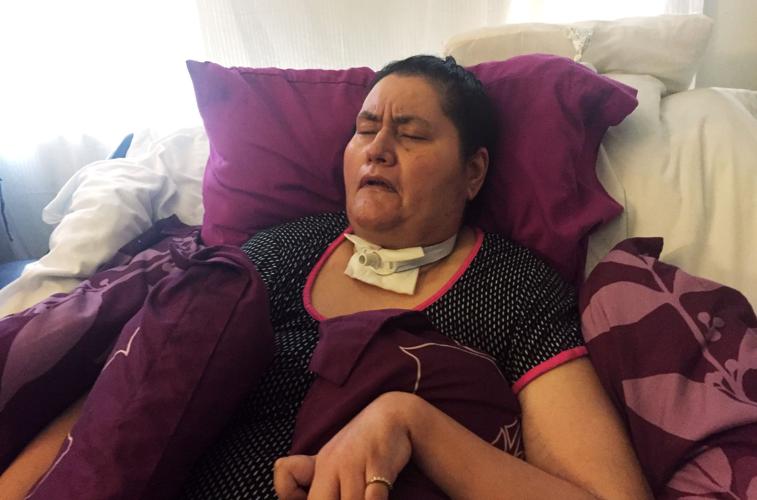
Tripp, who attended Sunnyside High School, volunteered every year at the Tucson Rodeo.
A Pima County jury last week awarded $12 million to a 46-year-old Tucson woman who was severely incapacitated by what her lawyers say was a hospital medical error.
The jury’s verdict in favor of Esmeralda O. Tripp and against the University of Arizona Health Network, now Banner-University Medical Center Tucson, is the largest civil verdict reported in Arizona to date this year.
It is also the largest medical malpractice verdict in Pima County since at least 2004, said Kelly Wilkins, an attorney and partner with Snell & Wilmer in Phoenix, who has been tracking Arizona verdicts for 13 years.
“Now she can get the round-the-clock care she needs,” said David Wenner, a lawyer for Tripp, who is a mother of four and grandmother of seven. “Her family shouldn’t be homebound because of this tragedy.”
Lawyers for the hospital said an appeal of the verdict is likely, and they emphasized that the jury found Tripp was partially at fault.
The total verdict was $15 million but was reduced by $3 million due to fault attributed to the plaintiff.
The defendants included the UA Health Network, the Arizona Board of Regents, University Physicians Healthcare, University Medical Center Corp. and the UA College of Medicine.
Banner Health was not named as a defendant in the case. But in 2015, Phoenix-based Banner Health merged with the UA Health Network, became the surviving entity and assumed its liabilities. The UA Health Network included University Medical Center Corp. and University Physicians Healthcare.
“We are truly sorry for the medical outcome that occurred for Ms. Tripp and her family,” Christoper J. Smith and Kathleen L. Leary, lawyers for the UA Health Network and other defendants, said in a written statement.
“We believe these physicians acted in good faith with sound medical judgment based on the information they were provided.”
The money was awarded to Tripp, who is now in a persistent vegetative state, via Tucson-based conservator Robert B. Fleming. The jury found the “relative degree of fault” in the case was 20 percent for Tripp and 80 percent for the defendants.
Lawyers for the hospital and other defendants had argued, among other things, that Tripp did not provide accurate information about her medical history when she went to the emergency room with pain and thin blood on the afternoon of Sept. 13, 2013, and that they acted appropriately based on the available information.
But her lawyers and her daughter say Tripp most certainly gave information she believed to be accurate. She’s not a medical professional and she trusted the doctors who were caring for her, they say.
“They made this whole case about her,” said Brian Snyder, another of Tripp’s lawyers. “They were trying this case on dragging her through the mud. They knew she couldn’t respond.”
Tripp’s daughter, 26-year-old Jamaica Tripp-Serrano, sat through the entire trial and said it was upsetting to hear lawyers for the hospital try to blame her mother.
She maintains doctors were in error when they chose to give her mother a dangerous drug to treat her symptoms, and says that’s clearly why her mother was deprived of oxygen to the brain. It wasn’t because of anything her mother did, she said.
Tripp-Serrano said she hopes her mother’s case sheds light on medical errors, which can go unnoticed due to confidential settlements.
“Do your research, ask questions,” she said. “We trust doctors, put our lives in their hands. But they can make mistakes.”
Three-week trial
The verdict came Monday after a three-week trial. The jury deliberated for three and a half hours.
Tripp’s Phoenix-based lawyers argued that a medical resident violated the hospital’s own guideline and standard of care by giving Tripp the drug Profilnine after Tripp went to the emergency room on the advice of her primary care physician because her blood was unusually thin.
She also had “flank pain” — pain in her upper abdomen, back and sides.
Tripp’s lawyers contended that a little more than two hours after getting the Profilnine, which controls bleeding, Tripp suffered significant blood clots and a heart attack that caused brain damage. The drug carries a risk of thrombosis and clotting that can cause a heart attack or stroke, her lawyers argued.
“I was really troubled that they didn’t say, ‘We admit we violated our guideline.’ They litigated that to the death,” Wenner said.
“Nobody is saying doctors are bad people. But on this day they weren’t at their best.”
Tripp was then hospitalized for seven weeks and is now in what her lawyers in court filings classified as a chronic vegetative state.
The hospital where she got her care was the UA Medical Center’s university campus, 1501 N. Campbell Ave. At the time, it was operated by the UA Health Network. It is now called Banner-University Medical Center Tucson.
Hospital officials denied violating the standard of care and denied any negligence in the case.
“Emergency room physicians are regularly faced with making important medical decisions based on the information provided by patients and their families,” Smith and Leary wrote in a statement they said came from court proceedings.
“The physician’s capacity to act quickly on that information is vital to the best patient outcome, and in some cases may even make the difference between life and death.
“No one expects to have an emergency medical situation, but a patient’s knowledge and willingness to provide the most accurate information about symptoms, health history, current medications and allergies is paramount to the physician’s ability to deliver the right care in the safest manner.”
At the time she sought help at the emergency room, Tripp had been taking the blood thinning drug Coumadin because of blood clots in the veins in her legs and lungs many years before, motions filed by her attorneys say.
Dangerous drug
Lawyers for the hospital said Tripp was taking four times the level of Coumadin that she’d been prescribed, which complicated her case. They also said she claimed to have a medication allergy that turned out to be inaccurate.
Tripp, who was 42 at the time, had a history of hypertension, irregular heartbeat, heart disease and seizure disorder, court documents say.
That day, Tripp’s blood testing showed higher-than-normal levels of Coumadin, which means the blood is too thin and the body is taking too long to clot, putting the patient at risk for bleeding.
Doctors measure blood levels by a standard called the international normalized radio (INR) and the ideal therapeutic range is two to three.
On the afternoon of Sept. 13, her lawyers say, Tripp’s primary care physician told her that her INR measured at 13 and instructed her to go to the hospital.
It wasn’t the first time Tripp had gone to the hospital because of a high INR. Her lawyers say that from 2006 to 2013, Tripp had been seen at the hospital several times for higher than normal INR and that on each occasion she’d been successfully treated with either Vitamin K or fresh frozen plasma, or both.
But Tripp’s lawyers argued that on Sept. 13, 2013, a medical resident eight weeks out of medical school and her attending doctor decided that Tripp’s INR should be rapidly reversed with the blood clotting medication Profilnine, which was given to Tripp in the early-morning hours of Sept. 14, 2013.
The hospital guidelines say Profilnine should be used if the patient has serious or life-threatening bleeding, or if the patient requires emergency surgery.
Therein was the key argument of Tripp’s lawyers — that Tripp did not have life-threatening bleeding and did not need a fast-acting treatment to bring down her INR level. A preliminary report indicated Tripp may have had appendicitis, and that’s when the Profilnine was administered. But it turned out she did not need surgery for appendicitis.
Hospital officials argued that Profilnine is quickly becoming standard treatment for reversing a high INR and that giving Tripp the drug was within the standard of care.
Within 30 minutes of getting the Profilnine, Tripp’s INR was within therapeutic range. But her lawyers say that about two hours later she screamed in pain and that her heart rate and blood pressure went extremely high.
Court documents show a code arrest was called. The doctors gave her the clot-busting drug TPA, which helped restore her heart rate and oxygen levels.
“After approximately two hours, Ms. Tripp’s vital signs, including her blood pressure, heart rate and the level of oxygen in her blood, had returned to normal levels,” lawyers Wenner, Snyder and co-counsel Kevin Keenan wrote.
“Nonetheless Ms. Tripp did not ever regain consciousness.”
Tripp’s lawyers said the Profilnine led to the code arrest. But the defendants filed court documents suggesting Tripp’s persistent vegetative state and arrest were more likely due to her underlying conditions than the Profilnine.
Family impact
Tripp is being cared for in a hospital bed in the den of her family’s home by her husband and her children. She has a feeding tube and needs to be bathed and turned regularly to prevent bedsores.
A caregiver provided by the state’s Medicaid program has been coming four hours per day, five days per week, Wenner said.
The jury award will allow Tripp to have better care and it will no longer be financed by Medicaid, her lawyers said.
Wenner and Snyder say the defendants initially offered to settle for $1 million. Lawyers for the defendants would not confirm whether that’s true.
“Responding to this question would inappropriately reveal information about a confidential settlement negotiation,” Smith and Leary wrote.
Tripp-Serrano said her mother was born and raised in Tucson, attended Sunnyside High School, loved horses, collected angel figurines and volunteered as a ticket taker at the Tucson Rodeo every year.
Above all, she loved caring for her family. On Friday, Tripp-Serrano was in the kitchen making horchata from one of her mother’s recipes. The family said it believes Tripp still has some awareness and can feel their love for her.
Tripp-Serrano said she knows that juries often side with doctors and hospitals in malpractice cases. But she also knows the jury saw the truth in this case, she said, and that it was undisputed the hospital gave her mother the Profilnine.
“She’s been in bed for four years. We are so grateful she will live a better life,” Tripp-Serrano said. “We still believe she’s there and we will take care of her as long as God allows us.”
“Nobody is saying doctors
are bad people. But on this day
they weren’t at their best.” David Wenner, lawyer for Esmeralda O. Tripp







